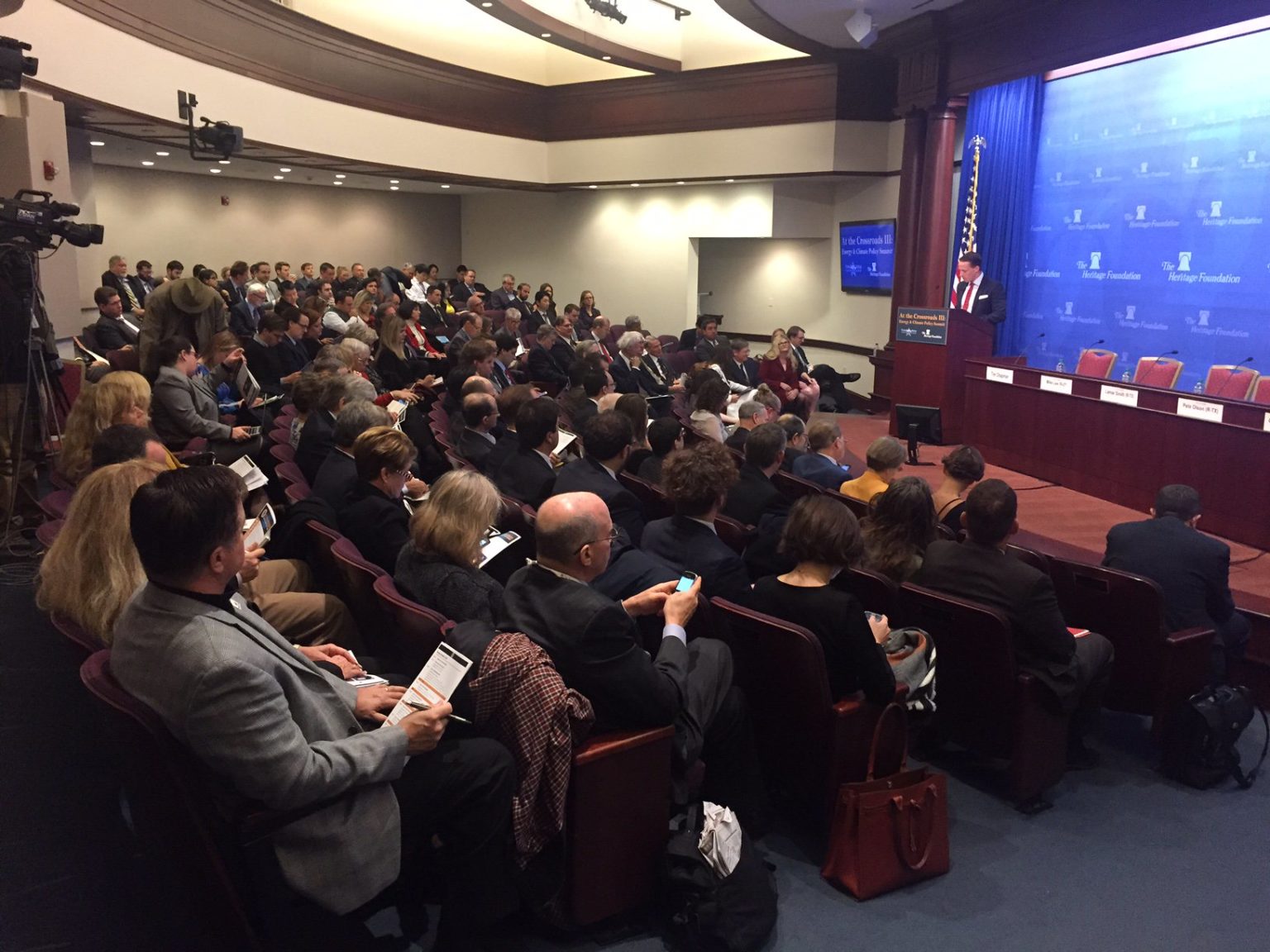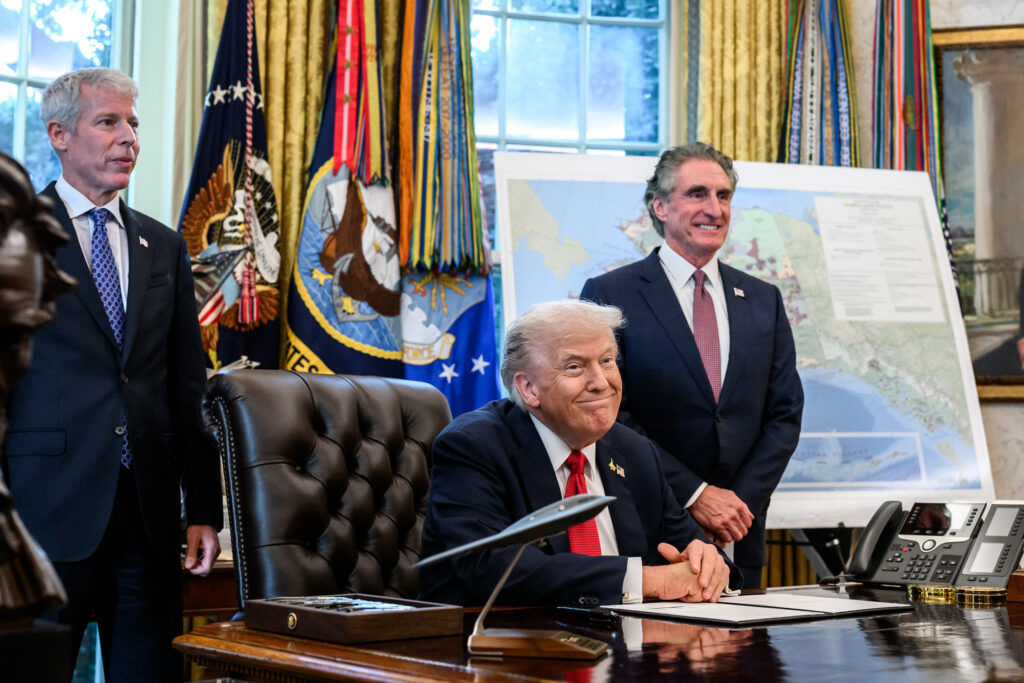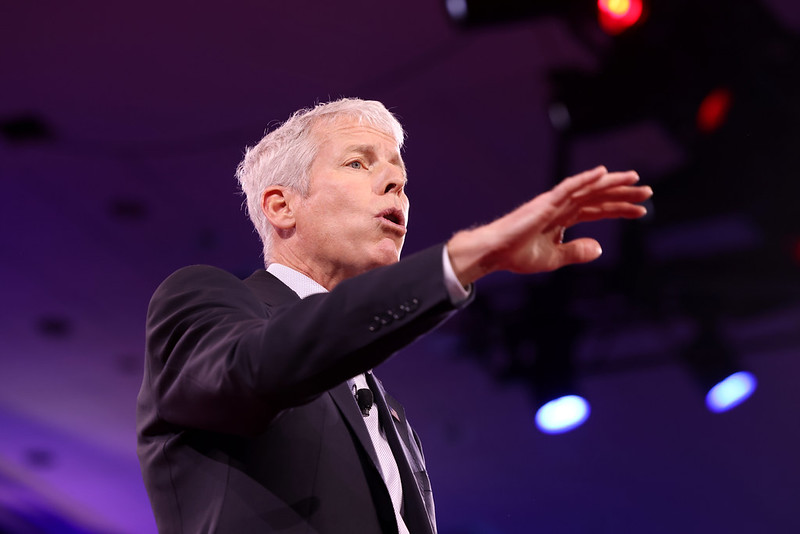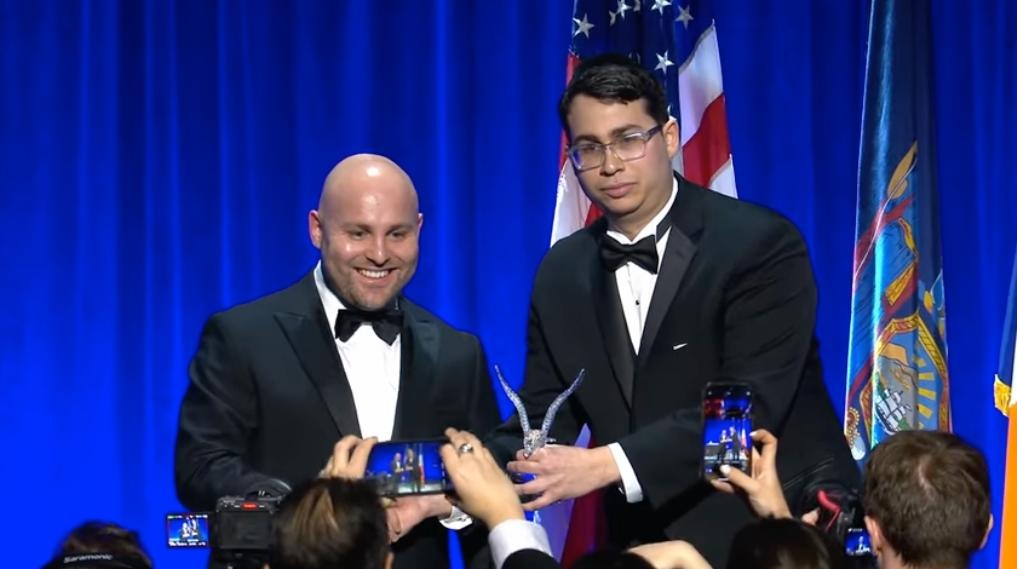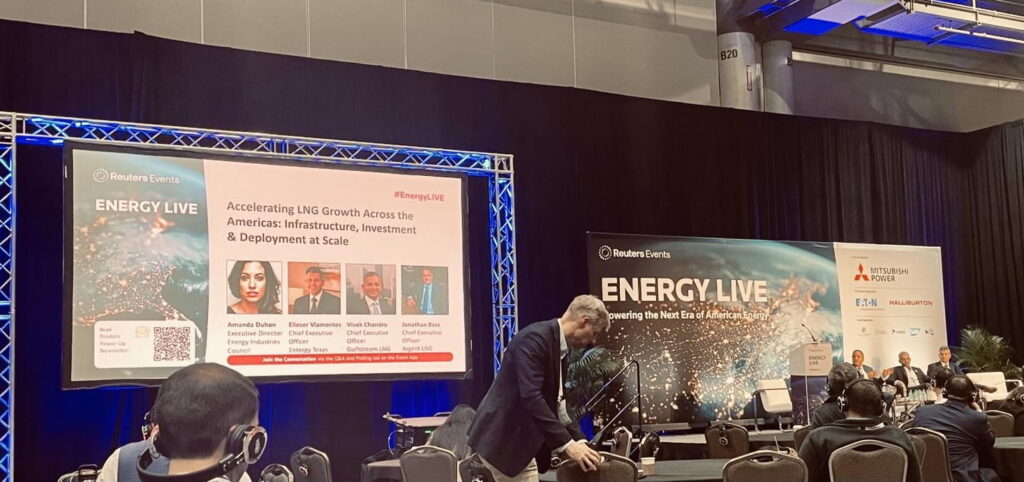This morning, while introducing the Heritage Foundation’s “premier energy-and-climate-policy event in America,” Becky Norton Dunlop offered a fleeting wisp of reasoned reality.
“A growing economy and an improving environment go hand in hand,” Dunlop said. She wasn’t, however, referring to the near-exponential growth in renewable energy jobs that have helped lift the country from the worst recession in a generation and the worst financial crisis in 75 years, the conditions that loomed over the last presidential transition. Nor was she referring to the historic decoupling of Gross Domestic Product from greenhouse gas emissions, which has shown consistent economic growth over the past five years both in the United States and globally while emissions have stabilized and slightly reduced at both scales.
Rather, Dunlop, who is reportedly assisting President-elect Trump’s transition efforts, was referring to stripping public health and environmental oversight of fossil fuel companies and creating “an atmosphere of freedom.”
So it proceeded throughout the “At the Crossroads III: Energy and Climate Policy Summit,” hosted by Heritage and the Texas Public Policy Foundation.
Strong rhetoric backed by nothing besides someone else’s rhetoric. Claims based on stories from the fake news websites that populate so many Facebook feeds. Arguments based on fake science funded entirely by oil and gas companies.
Oil and coal are environmentally friendly because … we say they’re environmentally friendly … Or, Sea levels have been rising at the same rate for 100 years. (About sea level rise…)
The Hosts: Heritage Foundation and The Texas Public Policy Foundation
The Heritage Foundation is a conservative D.C. think tank that regularly promotes climate science denial through its publications and the public statements of its “policy experts.”
Once seen as closely allied to the Republican Party and the Reagan administration, the Heritage Foundation has recently undergone a considerable shift, as The New York Times described: “Long known as an incubator for policy ideas and the embodiment of the party establishment, it has become more of a political organization feeding off the rising populism of the Tea Party movement.”
The Heritage Foundation has also emerged as one of the most influential forces behind Donald Trump‘s transition team. As Politico reports:
“Part gatekeeper, part brain trust and part boots on the ground, Heritage is both a major presence on the transition team itself and a crucial conduit between Trump’s orbit and the once-skeptical conservative leaders who ultimately helped get him elected.”
According to ExxonSecrets, Heritage Foundation has received $780,000 from ExxonMobil since 1998. According to Greenpeace, The Heritage Foundation received $2,738,571 from Koch foundations between 2005 and 2011, with total Koch foundation grants between 1997 and 2014 adding up to a grand total $5,712,845.
The Texas Public Policy Foundation (TPPF) is an Austin-based think tank that has received at least $911,499 from Koch-related foundations between 1998 and 2014 and nearly $4 million from the Donors Capital Fund and DonorsTrust, considered the “dark money ATM” of the Koch network.
Craig McDonald, director of Texans for Public Justice, told the Texas Observer, “TPPF‘s donors are a Who’s Who of Texas polluters, giant utilities and big insurance companies. TPPF is thinking the way its donors want it to think.”
The Climate Denial and Dirty Energy Summit
With a generally gloating tone, a few consistent themes were hammered over and over at this summit: that Trump would “unleash” oil and gas, that Scott Pruitt’s appointment to lead the EPA would mean a stripping of regulations for fossil fuel industries, and, of course, that the science of climate change was unclear, and that most climate scientists are part of a vast conspiracy started by the United Nations in the 1970s.
After some brief introductory remarks by the Heritage and TPPF organizers, the day’s sessions on Congressional updates, energy policy, the economy, and “science” featured a who’s who in fossil fuel–funded climate deniers. Here are some highlights.
The Honorable Mike Lee (R-UT), Member, Senate Committee on Energy & Natural Resources, and Chairman, Subcommittee on Water & Power
Senator Lee, who has received hundreds of thousands of dollars from Chevron, Koch Industries, and other dirty energy companies, argued for the transfer of federal lands to state governments, and made the case for a “decentralization” of federal regulation of energy industries to the state governments.
On fracking:
“Despite the Chicken Little predictions of so many doom and gloom environmentalists out there, oil and natural gas production has boomed over the last decade largely because of the shale evolution that has taken place because of technological innovation.”
The Honorable Lamar Smith (R-TX), Chairman, House Committee on Science, Space and Technology
Rep. Smith, while taking a break from his ExxonMobil-funded duties, talked about issuing subpoenas to find out what climate advocacy groups and state attorneys general knew about what Exxon knew about climate science.
On climate advocates:
“The environmental extremists who fight against American energy are here to stay. They are determined to stop Americans from having access to affordable power.”
On the EPA’s endangerment finding for carbon dioxide (CO2):
The agency wants to “hide information” from the American people. “They cherry picked the data.”
About the Clean Power Plan:
“The rule will have little or no impact on global temperatures. Regulations should be based on sound science, not science fiction.”
The Honorable Pete Olson (R-TX), Chairman, Subcommittee on Energy & Power, House Committee on Energy & Commerce
Rep. Olson, who called fracked oil and gas “Liquid American freedom,” spent a lot of his time talking about how unfair and overly restrictive the EPA’s clean air rules were, while also applauding the agency and giving Republicans credit for writing the Clean Air Act and taking the pollution out of the air. The oil industry (and Koch Industries) is a big fan of Rep. Olson, and shows it in the campaign contributions rained down on him.
On climate science:
“There is climate change since the book of Genesis. I don’t believe that humans are about to destroy our Earth.”
On the Republican environmental tradition (but note that Olson voted against ozone — or smog — regulations):
“We are the party through Teddy Roosevelt that made our national parks. We are a party of our sportsmen that love the outdoors. We are the party that cleaned up the smog I breathed as a child in Houston to have clean air that my kids breathe today.
We will not pass a country on to our kids and grandkids that resemble the days where the Cuyahoga River was on fire.”
On nominated EPA head Scott Pruitt:
“I’m excited to have him come before our committee and say things I want him to say.”
The Honorable James Inhofe (R-OK), Chairman, Senate Environment & Public Works Committee
Senator Inhofe, the upper chamber’s most recalcitrant climate denier, reminded everyone about the Climategate non-story, and promised that Congress is going to use the Congressional Review Act to legislate away rules that Congress has already given federal agencies the authority to write.
On the Congressional Review Act (CRA):
”[CRA] is the vehicle that can be used if there is a regulation and you want to do away with it … the Senate can override. All it takes is 51 [votes] in the Senate to do this. We passed CRAs on all these regulations, but the President vetoes.”
On predicting the Trump victory:
“I asked, Is God really going to make America change that much? God’s not going to let that happen to America.”
On the United Nations and using climate change to consolidate world power:
“Keep in mind, the IPCC [Intergovernmental Panel on Climate Change] is the United Nations ‘power plan.’ That’s where it all started and it’s very important that people understand that.”
On Scott Pruitt as director of the EPA:
“You’ll love this guy.”
Corbin J. Robinson, Jr., Principal, Quintana Capital Group
Corbin Robinson, who made his riches off coal and gas, confessed that he doesn’t know much about politics or science — “I am just a business guy trying to do my thing” — before proceeding to give a lecture on climate science.
Speaking to the climate science deniers from the afternoon session:
“My guiding light in terms of understanding the science … They are the real heroes. I am here to honor you.”
On climate science:
“News bulletin: the world is warming. Of course. It’s been warming since 1750 when the ‘Little Ice Age’ ended. Sea levels have been rising. They’ve been rising for the past 100 years.”
On the media’s coverage of climate change:
“I must say the media has done a marvelous job of not presenting the facts. I can’t think of a more biased presentation. The educational community has not presented the facts. It is time in the next four years.”
On his proposal for a communications campaign:
“We need understandable bullet points. The science can’t be summarized, but the truth can be summarized … It’s time to go on offense. Develop a series of newspaper fold-outs with a series of bullet points on CO2. On CO2’s benefits for life and plant growth. CO2 always was and always will be. Man exhales CO2.”
David Kreutzer, Senior Fellow at The Heritage Foundation
A former economist with the controversial Berman & Company, Kreutzer spoke mainly about what he said were the economic costs and consequences of environmental regulations. He did not address President-elect Trump head-on.
Kreutzer lamented that CO2 emissions were not going to stimulate the economy. The debate, he argued, was how much regulations can hurt the economy, which he discussed without directly mentioning Trump’s new anti-regulations EPA chief, Scott Pruitt.
“We at Heritage were accused of having some sort of denier economic model,” said Kreutzer, who also decried both the Lieberman-Warner and Waxman-Markey proposed cap-and-trade bills for addressing climate change. Both of those bills failed to pass, though a cap-and-trade model has been quietly inserted into President Obama’s Clean Power Plan, which may never see the light of day in the next administration.
After disparaging cap-and-trade, Kreutzer moved onto the social cost of carbon, which he called “fiction.”
Patrick Michaels, Director of the Center for the Study of Science at the Cato Institute
Michaels, a long-time climate change denier, introduced his talk as one for “geeks.” Thereafter, he tore into climate change and climate science models.
There is an “epidemic of positive results in the [climate science] literature,” Michaels said, concluding this is the case due to “funding” issues, but not elaborating on what he meant by that. Michaels, of course, has admitted to taking 40% of the funding for his own work at the Cato Institute from the oil industry. The Koch brothers founded Cato.
“Science is very, very sick,” opined Michaels. “There is a natural variability, if you will, even if you assume the later warming is anthropogenic … The best solution is to do nothing. Because doing nothing is doing something.”
Michaels then called for President-elect Trump to do as he promised on the campaign trail: Rip up and toss out the United Nations Paris climate agreement. “We’re going to make climate great again,” joked Michaels.
Like Kreutzer, Michaels also discussed the social cost of carbon metric, but went further. “Social cost of carbon becomes the social benefit of carbon,” he said.
Patrick Forkin — Vice President of Strategy & Global Energy Analytics at Peabody Energy
Forkin stepped up as perhaps the coal industry’s most credible spokesman, being from the industry itself.
Coal is “affordable, secure, and widely available,” Forkin said, perhaps jubiliant that the incoming president has promised to bring back coal mining jobs. As The Washington Post reported today, many in coal country are “thrilled” about Trump’s looming presidency, though it remains doubtful as to whether he can live up to his promise.
While praising the role of coal in the energy economy, Forkin also downplayed the future of renewable energy.
“Our position is: There is a role for every source of energy. There is a role for renewables,” he stated. “But that role should be driven by unsubsidized free market economics. That’s not what’s been happening here in the U.S. In 2013, solar and wind received two-thirds of federal subsidies. In that same year, those sources only generated about 5% of electricity in the US.”
Forkin also echoed the Peabody Energy talking point about “energy poverty” and how lack of access to energy — namely self-interested coal-powered electricity — can impact poor people. Saying he couldn’t phrasae it better himself, Forkin ended his talk by quoting from Trump’s energy plan, written by Tom Pyle, a Koch-funded former lobbyist.
Allen Gilmer of Texas Independent Petroleum Producers Association (TIPPA)
Gilmer of TIPPA spoke on behalf of the independent oil and gas industry, or those wildcatters who made the hydraulic fracturing (“fracking”) revolution possible, as documented in the book The Frackers.
One of the protagonists in that book was Harold Hamm, the Trump campaign’s chief energy adviser and under consideration to become U.S. Secretary of Energy, who also is founder and CEO of the oil and natural gas company Continental Resources. Hamm was praised by another speaker during the Energy and Climate Policy panel, Mark Mills of the Manhattan Institute.
Poking fun at the Keep It In The Ground campaign, Gilmer told the audience, “Keeping it in the ground is like asking ‘Why don’t I just strangle my babies?’” U.S. Sen. Heidi Heitkamp (D-ND), considered a finalist for the Energy Secretary and Interior Secretary jobs, recently lashed out at that movement in an interview and blamed it for the Democrats electoral beating in November.
Gilmer said that he hoped that subsidies loomed for the mom and pop side of the oil and gas industry.
Dan Byers, Vice President of Policy for Institute for 21st Century Energy at U.S. Chamber of Commerce
Byers, who formerly worked for the George W. Bush White House, opened his talk by lamenting what he argued were false talking points about the energy industry, which he said “grinds my gears.” His current employer, the Institute for 21st Century Energy, is outspoken against environmental litigation, supports oil exports, and serves as Big Business’ main collective voice on energy issues in the U.S.
Since Trump won, publications have run pieces saying that “Trump can’t help coal,” lamented Byers. Arguing that the narrative is “nonsense,” Byers posited that coal production would plummet by a factor of 30% if Clinton had won. Trump on the contrary, while he might not be able to turn the U.S. into a coal superpower, can “help coal country a lot.”
The Paris climate agreement came up too, and Byers argued that it disproportionately hurts the U.S. while the rest of the world gets to partake in “business as usual.” Byers also claimed that coal is “good for the public health of the people of India and their wellbeing” and bashed the Keep It In the Ground movement, which his group has chided in the past.
“I think [Keep It In The Ground is] going to fail because it’s so intellectually indefensible, and it’s partly because of the hypocrisy,” said Byers.
Willie Soon, Astrophysicist
Soon spoke first on a panel called “Climate Intimidation: Chilling Climate Science.” He played the role of victim for having been revealed by The New York Times for taking money from the likes of Southern Company, ExxonMobil, the American Petroleum Institute, and Koch Industries for his part-time research at the Harvard-Smithsonian Center for Astrophysics. He was speaking as an independent scientist at this event.
Introduced as the “leading authority” on the association between solar activity and Earth’s climate, Soon said, as of late he has been “living under the dark cloud of censorship and intimidation.”
He also spoke of Greenpeace USA, which obtained his emails through the Freedom of Information Act, which was at the center of The Times’ investigation.
It is “unfortunate” they released emails but “I had nothing to hide,” he claimed, saying his motto was to “forgive all the bad people. But never forget.”
Soon had some choice words for another of his antagonists, Peter Gleick — who leaked to DeSmog the Heartland Institute documents revealing its strategy to cast doubt on climate science:
“Such a disgraceful guy who actually used a stolen Identity in order to get private documents.”
He concluded his remarks by talking about what Trump’s electoral win could mean for him and his (very few) fellow climate change denying scientists.
“Climate science as we know it has been dangerously corrupted by … these bullies of censorship,” he said. “They continue to hijack science for their own game. We must do something about this. Hopefully with a political win we can do something about this.”
William Happer of Princeton University
William Happer is an emeritus physics professor with Princeton University and former Director of the CO2 Coalition, a group formed in 2015 out of the former George C. Marshall Institute, where Happer was also previously chairman of the board.
“We’re doing our best to counter this myth that CO2 is a dangerous pollutant,” he claimed. “It’s not a pollutant at all.” He called those who claim that it is are part of the “CO2 defamation league.”
Meanwhile, Happer said most of the pollution in China does not originate from the oil, gas, or coal industries. Instead, what is that pollution’s point of origin? The Gobi Desert. He said:
“If you have a well-designed coal plant, what comes out of the stack is almost the same that comes out of a person’s breath. Most of it is water and CO2. It’s actually running, but nothing comes out of the stack. These plants are completely benign. What comes out of here is fine. It’s not a lot different from your own breath.”
Craig Idso of the Center for the Study of Carbon Dioxide and Global Change
Idso is the chairman and former president of the Center for the Study of Carbon Dioxide and Global Change. The Center’s stated mission is to “separate reality from rhetoric in the emotionally-charged debate that swirls around the subject of carbon dioxide and global change.”
“The scientific evidence supporting that position [that CO2 is a pollutant] is tenuous at best, ” Idso said, pointing to the reliance on computer models, as opposed to real-world observations.
Idso also claimed there are three chief “benefits” of CO2 in the atmosphere. That is, it “increases plant productivity, enhances plant water use efficiency, and helps plants” better handle stresses.
Saying he was hopeful Trump would change course, Idso said the Obama administration has far too long “besmirched and defamed the many virtues of carbon dioxide” and that “CO2 is not a pollutant. It is the very elixir of life.”
Roy Spencer of the University of Alabama at Huntsville
Spencer is a research scientist at the University of Alabama, Huntsville. He operates his own blog on global warming where he describes himself as a “climatologist, author, [and] former NASA scientist.” At today’s panel on CO2 as dangerous pollutant, Spencer acknowledged some warming is happening, but belittled the enormity of it and its current impacts on the planet.
“The amount of warming we’re seeing … global warming is not something that anyone will feel in their lifetime,” he claimed. “it is simply too slow for anyone to feel. Nevertheless, I am one of the skeptics who believes that adding CO2 to the atmosphere, theoretically, should cause some warming. I would expect slow warming to occur in the future — but I wouldn’t bet money on it.”
Richard Lindzen of Massachusetts Institute for Technology
Lindzen is the Alfred P. Sloan Professor of Meteorology at the Massachusetts Institute of Technology (MIT) as well as the Distinguished Senior Fellow at the Center for the Study of Science at the Cato Institute.
“Climate hysteria is a classic example of how capturing a narrative can turn absurd conjectures into presumptive truth,” he said at the podium. “And once you’ve done that, you have to defend yourself against that, even though it’s absurd.”
With a sense of satisfaction, Lindzen spoke of how both Trump and his Democratic Party opponent Hillary Clinton hardly mentioned climate change throughout their electoral battle.
“The role of climate change in the recent presidential election was interestingly subdued,” he said. “The President-elect was dismissive, while Clinton treated the issue with caution.”
He ended his remarks with this closing thought:
“It’s time to put the brakes on the climate alarm movement. The benefits [of increased CO2] would be immense, and would come with immense savings and not expenditures.”
Edited by Ashley Braun, with research by Mack Alvin.
Subscribe to our newsletter
Stay up to date with DeSmog news and alerts


